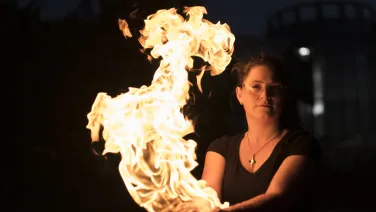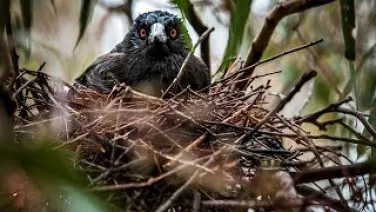
Move over magpies: are cuckoos the meanest bird?
It’s swooping season, that time of year when cyclists have one eye trained on the sky, and one ear cocked for the ominous thwk-thwk-thwk of magpie wings.
It can be hard not to take it personally when a magpie tries to stab your eye out. But, we’re told, they’re just doing their thing. They’re not being intentionally mean.
But what if a bird can be mean?
Enter: the cuckoo.
If there ever was a bird which could prove the case for actual meanness, it’s the cuckoo.
There are many species of bird in the cuckoo family, found all over the world. Here in Canberra,we have shining bronze-cuckoos, pallid cuckoos, fantail cuckoos, brush cuckoos, Horsfield’s bronze-cuckoos, and Pacific Koels.
While other birds go about their birdy business, building nests and raising chicks, these cuckoos instead invest all their energy into getting other birds to do all the work for them. Innocent birds will die along the way.
“It is terribly hard to watch what a cuckoo does,” Professor Naomi Langmore says. “But I wouldn't call them mean.”
Professor Langmore is an evolutionary ecologist at the ANU Research School of Biology, and a cuckoo apologist – sorry, cuckoo expert. Since it’s Bad Bird Season, I ask her to explain how it could possibly be that the cuckoo doesn’t mean to be mean, when it sure looks like it does.
Can you start by explaining the basic cuckoo modus operandi?
Well, the female cuckoo comes to the host nest and straightaway, she’ll remove one host egg. So right from the start, that's one little host chick that's gone.
Then, when the cuckoo chick hatches, the chick throws out the host eggs and the host chicks, one by one.
Which is murderous.
It’s hard-coded behaviour. Which is amazing.
Have you seen what the chicks look like?
Yes, and it’s hard to believe they’re capable of murder.
Yes, they look like embryos, naked and blind, and you'd think they wouldn't be capable of doing anything. But as soon as they feel something on their back, whether it’s a host egg or a host chick, their instinct is to push it out of the nest. It’s a hardwired behavioural response.
That this is their very first instinct in life doesn’t do wonders for the cuckoo’s reputation.
It is particularly hard to watch chicks getting pushed out of the nest, I have to say. And in Australia, they’re found by meat ants within minutes, and then within an hour or two, there's nothing left of the chick. The meat ants just devour them.
Horrible! And mean, surely?
It’s a very distressing natural process, but I wouldn't say it's mean. That implies some sort of intention to cause suffering, whereas the cuckoos are just doing what they've evolved to do. It's a perfectly natural process. Like when you watch a lion eat a gazelle, you don’t think they’re mean, do you?
But all lions eat gazelles. Cuckoos seem to be expressly going against what birds are supposed to do. It’s like they’re choosing to make bad life choices. Why?
Well, they’re brood parasites and we don’t exactly know why brood parasitism has evolved, but one theory is to do with their food supply, which is mostly hairy caterpillars. Other birds can’t eat hairy caterpillars because toxins in the hair irritate their stomach. But cuckoos have a special lining in their stomach so they can eat hairy caterpillars, which is fantastic.
But the problem is that very often there are these huge gluts of hairy caterpillars for a very short period of time. So, during that period of time when there's lots of food, the cuckoo can lay heaps and heaps of eggs, but then, when it comes time to feed those chicks, the caterpillars have all turned into butterflies or moths. There's not enough food around for the cuckoos to be rearing a brood of chicks. So at that point, they leave the chicks to be reared by someone else. That’s one hypothesis.
And what are the cuckoos doing with all their extra free time, since they don’t have to build nests or raise chicks?
It’s not like it’s an easy life for the cuckoos. They spend a lot of time finding somewhere to breed, and then a lot of time going back somewhere to overwinter.
The female cuckoo also has to spend a lot of time birdwatching. She has to have lined up a series of host nests that are all at the egg-laying stage. She’ll sit up in hiding in a tree and watch the host females building their nests, and then she'll sneak down when the host female isn't there and check what stage each nest is up to. She's monitoring usually around 15 different host females, watching them nest-building. It’s challenging, not easy.
So why don’t they just build their own nest?
I do often think it would be a lot easier for the cuckoo to spend five days building a nest than to spend all that time watching 15 females building nests and working out where they're putting them
But the cuckoos are sort of trapped, aren't they? Once you make that shift to using someone else's nest, then the evolutionary selection is for you to get better and better at that. That’s just the way the trajectory goes.
But I think the flipside of the harshness of that strategy is also the beauty of it: that the cuckoos are so beautifully adapted to their hosts. The awesomeness of their mimicry, and the cleverness of their strategies is really quite amazing to see.
What are some of those adaptations?
Most cuckoo hosts have evolved egg recognition and egg rejection. In those species, the host will look closely at her eggs and see whether they match the template she's formed of her own eggs, and reject any egg if looks wrong.
Over evolutionary time, the only cuckoo eggs which have passed this test are the ones that look more like the host egg, so then, as the cuckoo gets better and better at egg matching, the hosts have to get better and better at discrimination.
It's like an arms race.
Exactly, it’s a co-evolutionary arms race.
And the process of adaptation keeps going. For example, in the Australian bronze-cuckoos, hosts have evolved chick recognition, and it seems that’s because the hosts can’t recognize the cuckoo eggs, probably because they have dark, domed nests, meaning they can’t tell if eggs are a different colour. The host female flies to her nest, and she looks in and all she can see is her little white eggs, and she thinks everything's fine.
So there's been really strong selection in those hosts to move on to the next stage of the arms race, which is chick recognition. And the really cool thing is that the Australian bronze-cuckoos have now evolved chicks that match the host chicks.
We have hosts that have black chicks with white down; we have chicks with a creamy colour down; we have pink chicks. And the cuckoo that exploits each of those hosts has evolved chicks with the same skin colour, and the same colour down, and the same mouth colour too. It's really, really cool.
And then the host bird raises the cuckoo chick as if it’s their own, even though it grows into a completely different-looking bird.
This has been one of the biggest puzzles of cuckoo research: females can be so incredibly good at spotting these tiny differences between eggs, but they don't seem to notice anything wrong with this giant chick that grows to sometimes ten times as big as they are.
There are some various theories to explain it. One explanation is that it's harder to evolve chick recognition because chicks change so much day-to-day, and you don't want to risk rejecting your own chick just because it got big, which is usually a good thing. So a cue based on chick size could really backfire.
Do the mother cuckoos ever come back to see if their chicks made it through okay?
For the most part, no. Although, there's a study on cowbirds, which is a species of cuckoo in North America, that suggests that actually, the female goes back to the nest and, if her egg has been rejected, she destroys the host’s nest.
So, if her egg was thrown out of the nest, the cuckoo gets rid of all the other eggs just for pure revenge?
Well, it sounds like pure revenge, but actually, what it does is it makes the host female build a new nest, so the cuckoo can try again.
I’m sorry, but it seems extremely mean.
You have to have admiration for them. I just can't believe it when I'm out there in the field and I discover, first of all, another host defence, and then, the brilliant counter-adaptation that the cuckoo has to that defence. It’s evolution in action, really, and seeing how incredibly fine-tuned it can be, it's just awesome to see.
In the field, do you find yourself rooting for one side over the other? Are you Team Parasite or Team Host?
I feel for both sides. All my fairy wrens are colour-banded and I’ve known them for years. And when a female is being parasitised, year after year, I'm just longing for her to get one of her own broods out.
But at the same time, it's just so miraculous to find a cuckoo egg and then to see how it all plays out, so I get incredibly excited every time I find a cuckoo egg. And I love the cuckoo chicks. They're beautiful.
They don’t look beautiful!
Not when they’re just hatched, but right before they fledge, they are very cute. They have fluffy feathers and short tails and big eyes.
So, in conclusion, which one is meaner: the magpie or the cuckoo?
I'd say they're exactly the same. They're both just trying to look after their young. We'd all do anything to protect our babies, and that's what they're trying to do too.
Go cuckoo with a Bachelor of Science majoring in Evolution, Ecology and Organismal Biology at ANU.
Header image caption: A male superb fairy-wren feeding a Horsfield’s bronze-cuckoo fledgling. Credit: Mark Lethlean







